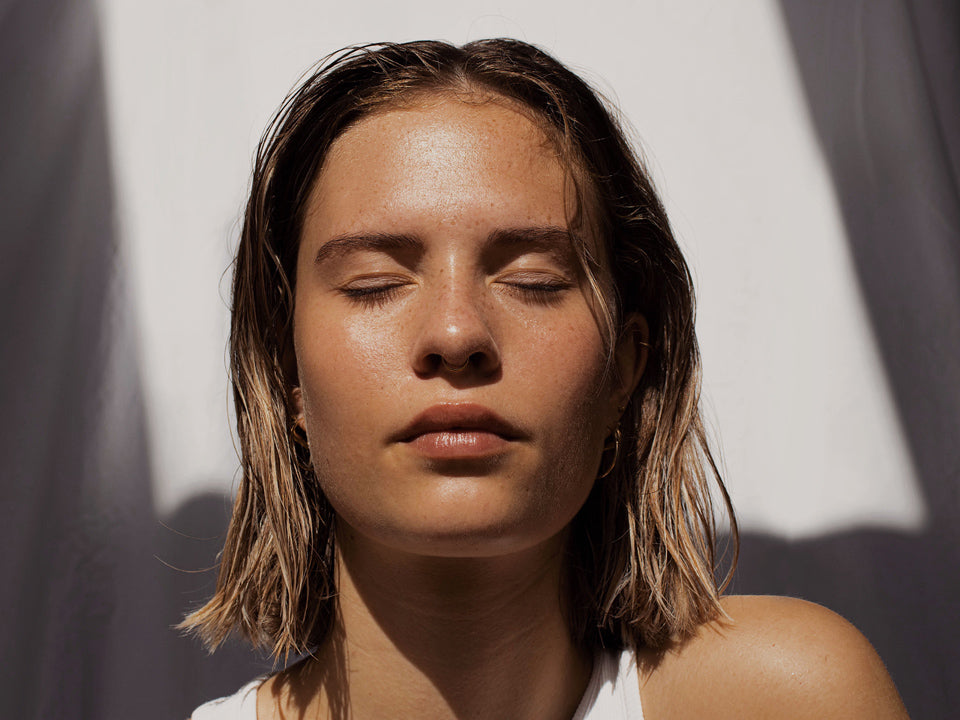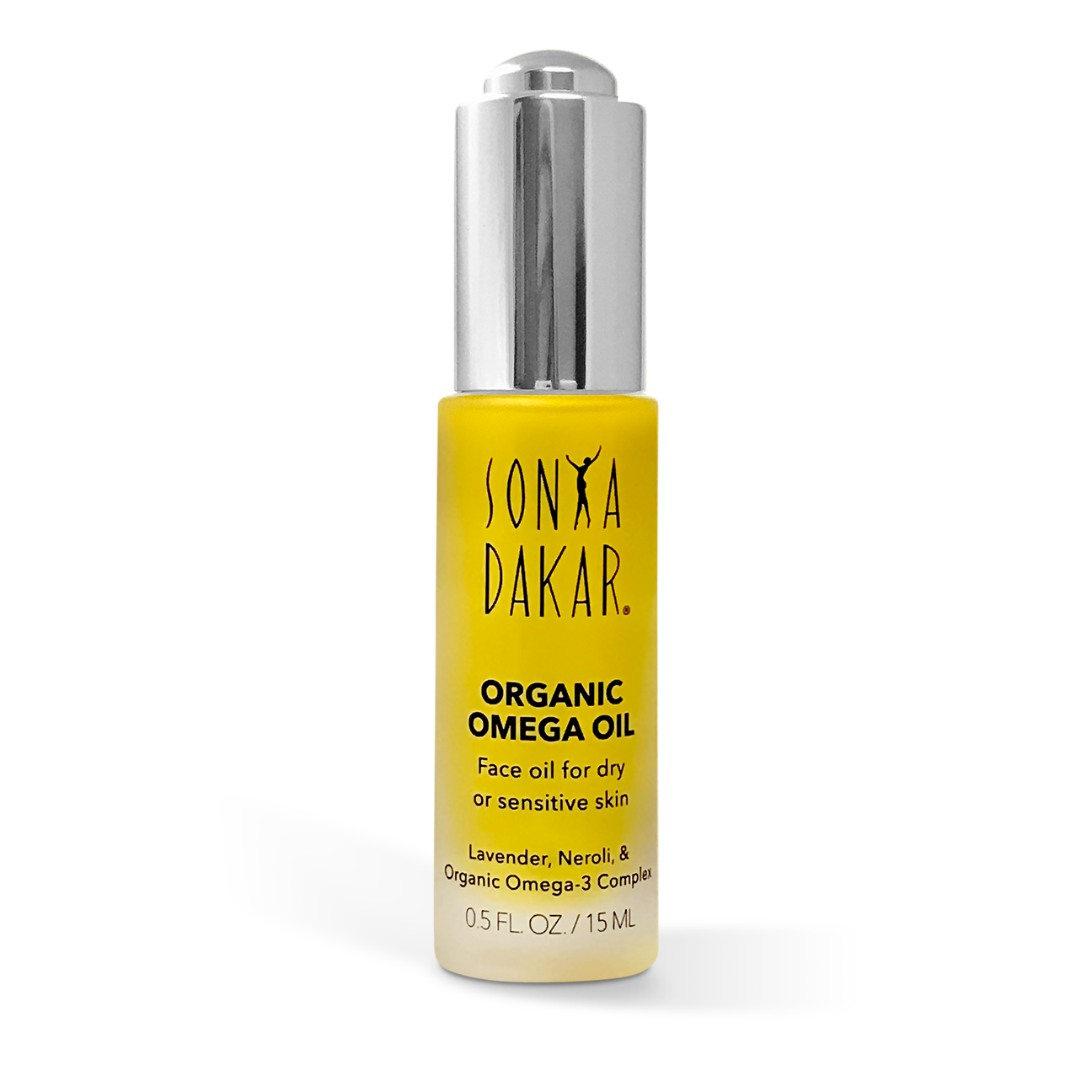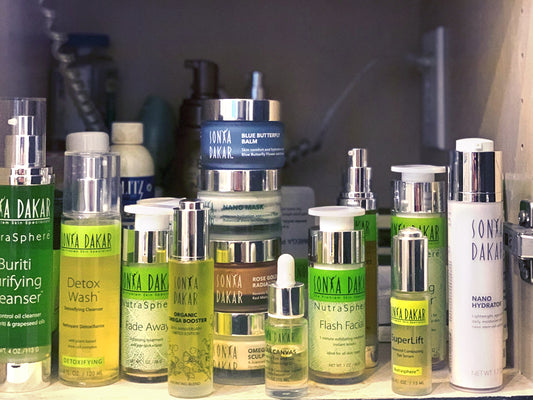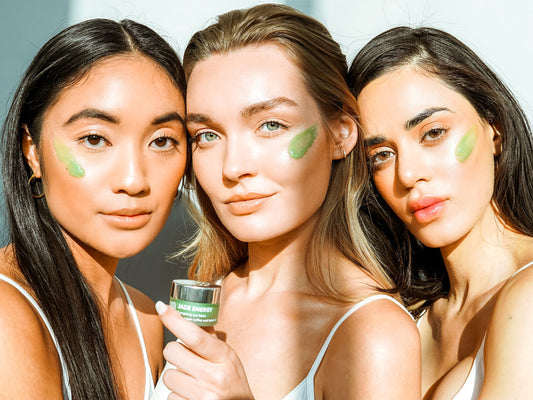
Best Vitamins for Glowing Skin
A good beauty routine will make a huge difference in the quality of skin. Though if you really want to up your skincare game, proper nutrition is a must for healthy, glowing skin that will last a lifetime. While eating habits are often disrupted by a busy lifestyle and numerous other factors, supplements offer an easy way to add missing nutrients into our diet. Though, how does it all work and how do we choose the right supplement? We asked nutrition professionals Melanie Murphy and Nicolette Jahnke to help explain the science and what are the best vitamins for healthy skin.
Nicolette Jahnke RN, BSN & Certified Holistic Health Coach
@its_nicolettemarie
Which anti-aging supplements are best for dry skin?
NJ: Supplements that provide antioxidant and anti-inflammatory properties such as Omega 3s, Vitamin E, Vitamin C, Collagen or even CoQ10 can help promote healthy aging and also keep your skin healthy and glowing from the inside out.
As for dry skin, up your dose of healthy monounsaturated fats like salmon, olive oil, nuts and seeds to keep your body lubricated and hydrated.
What are the best anti aging supplements and how do they help reduce visible signs of aging?
NJ: The best anti aging supplements you can take to reduce visible signs of aging are:
Vitamin A is a powerful anti-aging vitamin and helps to promote cell turnover, as well as increase firmness, tone, and elasticity in your skin. It also visibly reduces the appearance of fine lines and wrinkles.
Vitamin C because it reduces oxidative stress which helps cells regenerate and produce healthier skin while pumping the brakes on wrinkles and making your complexion more vibrant.
Vitamin E because it also has antioxidant and anti-inflammatory properties. Both factors are important in skin regeneration and cell turnover, the process in which dead skin cells slough off and healthier, more radiant cells take their place.
When should I start taking anti aging supplements?
NJ: You can start taking these at any time! The sooner, the better for your body, your skin, and overall health. However, always consult with a doctor or physician before changing or adding any medications or supplements.
What is the best detox supplement?
NJ: In all of my years searching for a good detox supplement, the best I have ever found and taken is Sonya Dakar’s DTOX. Why? Because it supports daily detoxification. Her formula provides methylated B12 and folate along with bifunctional nutritional support designed to enhance the activities of several liver detoxification enzymes and support Phase I and Phase II detoxification pathways.
It also contains powerful detoxifying botanicals such as artichoke leaf, watercress, pomegranate, green tea leaf extract, and milk thistle to help cleanse the liver, lymph system, kidneys, and more. Expelling toxins and free radicals allows the body to function efficiently with less stress and fatigue while skin looks clearer, brighter, and more radiant. It also supports efficient collagen production for ultimate skin radiance.
 Can vitamins help tired skin? How do they help make skin look vibrant and energized?
Can vitamins help tired skin? How do they help make skin look vibrant and energized?
NJ: Not only can vitamins help tired skin, but they are essential for it! When our bodies are nourished and the microbiome is restored, our bodies are able to function efficiently with less stress and fatigue, allowing your skin to look clear, brighter, and more radiant. When you hear people say “our beauty starts from within,” they aren’t wrong. The truth is we can buy all the creams, serums or lotions, but if we aren’t nourishing our cells and bodies on the inside, we won’t radiate on the outside. Many vitamins are antioxidants have anti-inflammatory properties, which leave you with energized and vibrant skin.
What vitamins help with skin repair?
NJ: There are many things that can wreak havoc on your skin and cause it to lose strength and elasticity. Some people fail to realize is that our skin is sensitive. Every day our skin is exposed to pollutants, toxins in the air, harsh chemicals, etc.
Vitamin C is great for skin because it helps with the production of collagen. It is one of the best vitamins for skin repair because it can help to keep your skin firm by retaining elasticity, and as an antioxidant protects your skin from damage by destructive free radicals. It is also good for your skin as it promotes regeneration; in particular, it is used for the repair and growth of tissues throughout your body.
Vitamin E is also excellent because it’s packed with antioxidants, which fight free radicals and help with regeneration by improving your skin’s texture, moisture and softness. The cool thing about Vitamin E too is that it also helps store Vitamin A, which can help to treat wrinkles.
Vitamin A is also necessary for the process of skin regeneration. It helps to fix pesky blemishes and signs of aging because it’s required for the production of epithelial cells where regeneration takes place.
Vitamin K is invaluable when it comes to healing and skin repair due to its role in blood clotting.
What are the best vitamins for skin that’s inflamed and why?
NJ: The best vitamins for inflamed skin are the ones that have anti-inflammatory and antioxidant properties, such as: Vitamin A, C, D, E. Antioxidants help fight free radicals, which cause inflammation in our bodies.
Vitamin A is ideal because it decreases inflammation by keeping the immune system from overreacting.
Vitamin C is an antioxidant. Therefore, it gets rid of free radicals that can damage cells and tissue, which means fewer triggers for inflammation.
Vitamin D plays a role in the modulation of the inflammation/immune system because it regulates the production of inflammatory cytokines and inhibits the proliferation of pro-inflammatory cells.
Vitamin E has both of these anti-inflammatory and antioxidant properties, making it ideal for taming inflamed skin. It exhibits anti-inflammatory effects by decreasing CRP (c-reactive protein) and inhibiting the release of pro-inflammatory cytokines.A good beauty routine will make a huge difference in the quality of skin. Though if you really want to up your skincare game, proper nutrition is a must for healthy, glowing skin that will last a lifetime. While eating habits are often disrupted by a busy lifestyle and numerous other factors, supplements offer an easy way to add missing nutrients into our diet. Though, how does it all work and how do we choose the right supplement? We asked nutrition professionals Melanie Murphy and Nicolette Jahnke to help explain the science and what are the best vitamins for healthy skin.
Melanie Murphy, MS, RDN
@healthnmellness
What are the best vitamins for healthy, glowing skin?
MM: Vitamin C, also known as ascorbic acid, is a water soluble vitamin that is imperative for healthy skin. Vitamin C is an antioxidant that has been scientifically shown to reduce our risk for skin cancer, and it is also a precursor to collagen production. You may know that collagen is the most abundant protein that we have in our body. It makes up our bones, skin, muscles, tendons and ligaments, and acts like “glue” keeping everything firm and connected - including our skin! And without vitamin C, our ability to make collagen will suffer. We get vitamin C from many plant-based foods like leafy greens, berries and citrus fruits and a wide variety of other fruits and veggies.
Vitamin A comes in two forms, retinoids and carotenoids, and is essential for maintaining the integrity of our skin. It can help to protect our skin from UV damage, and can help with issues such as acne and psoriasis too. It helps to stimulate the production of new skin cells and promotes the production of collagen too. Focus on eating orange and yellow foods like carrots, sweet potatoes, squash and bell peppers to increase your dose of vitamin A.
Vitamin E acts as an anti-inflammatory for the skin, and can also help prevent UV-damage. It is a powerful antioxidant, which can help fight against free radical damage in our body and skin. Nuts and seeds are great sources of vitamin E, as are leafy greens like spinach and broccoli.
Selenium is a mineral that works hand-in-hand with vitamin E to protect our skin from free-radical damage like those that could lead to wrinkles. Selenium and vitamin E work together to protect our cells, and can help to slow down premature aging. Eat 1-2 Brazil nuts each day for your full dose of daily Selenium.
Zinc is a mineral that we need for countless cellular processes in our body. It is also very important in preventing cellular damage and reducing inflammation in our skin. It acts as an anti-inflammatory and can reduce the chances of scarring on the skin from acne or other wounds. Shellfish, legumes, lentils, nuts and whole grains are all great sources of zinc.
Omega 3s are polyunsaturated fats that are incredibly important for lubricating our body, joints and skin. Healthy fats like Omega 3s help build up our skin’s cell walls and lower inflammation too. Omegas can help to keep itching, rashes, and other skin irritations at bay. Opt for fatty fish like salmon or flax seeds to get your healthy Omega 3s.
What are the best supplements for acne?
MM: Our skin is our body’s outermost layer. If you are experiencing skin-related issues, it’s most often a sign of an internal imbalance that has finally worked its way to your skin.
Fish Oil (Omega 3s): As mentioned above, fish oil has powerful antioxidant benefits and can help reduce swelling and irritation. You have to be careful about the type of fish oil supplement you choose, though, because some products are made from larger types of fish that can be high in heavy metals toxic to our body and skin. Opt for a fish oil supplement from smaller fish like anchovies, or from plant-based sources like those used in Sonya Dakar’s Omega Glow supplement.
 Probiotics: Gut health and skin health go hand-in-hand. If your gut is unhealthy or imbalanced, skin problems are sure to follow. Our microbiome is made up of many bacteria and even some viruses and fungi. We need a well populated and diverse microbiome for optimal health. If we are experiencing conditions like leaky gut, which can occur from food allergies or a poor diet, for instance, we might experience acne or eczema. The lactobacillus strain of bacteria that is used in Sonya Dakar’s probiotic can not only help diversify our microbiome and promote gut health, but it can also help to calm and comfort our skin too.
Probiotics: Gut health and skin health go hand-in-hand. If your gut is unhealthy or imbalanced, skin problems are sure to follow. Our microbiome is made up of many bacteria and even some viruses and fungi. We need a well populated and diverse microbiome for optimal health. If we are experiencing conditions like leaky gut, which can occur from food allergies or a poor diet, for instance, we might experience acne or eczema. The lactobacillus strain of bacteria that is used in Sonya Dakar’s probiotic can not only help diversify our microbiome and promote gut health, but it can also help to calm and comfort our skin too. B-Vitamins: When taken internally, B-vitamins can help the body produce new skin cells. A nice byproduct of taking a B-vitamin supplement is increased energy too! Most people associate Biotin, the most favorable of the B-vitamins, with healthy skin, but I’d opt to take a robust B-complex instead.
B-Vitamins: When taken internally, B-vitamins can help the body produce new skin cells. A nice byproduct of taking a B-vitamin supplement is increased energy too! Most people associate Biotin, the most favorable of the B-vitamins, with healthy skin, but I’d opt to take a robust B-complex instead.
What vitamins should we look for in supplements that help clear our skin and why?
MM: When searching for a well-rounded supplement - like a multivitamin - to support healthy skin, make sure it has Vitamin A, Vitamin D, Vitamin E and Zinc. Ideally, choose a supplement that has minimal additives and fillers. Too much of those can add up and contribute to more toxic build-up.




